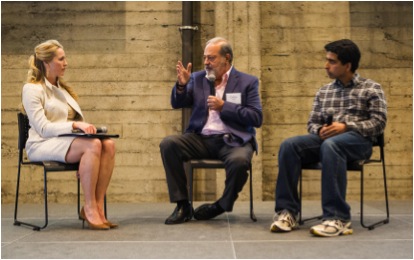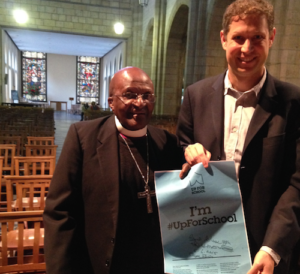Six Education Moments at WEF Africa 2015

Photo Courtesy of the World Economic Forum.
Last Friday, the World Economic Forum on Africa 2015 came to a close. Throughout the three-day forum in Cape Town, South Africa, there was much to celebrate including Africa’s burgeoning economy. Within the last fifteen years, Africa’s economic growth rate has surpassed the global GDP by two to three percentage points. Foreign investment in natural resources are encouraging regional growth — growth that is likely to remain above 5 percent for the rest of the year. And, while already home to the world’s largest concentration of youth, Africa’s population of working-age young adults is projected to double during the next 25 years. In short, Africa is having a “moment.”
However, speakers like Oxfam International’s executive director, Winnie Byanyima, argued that Africa’s youth are perhaps the continent’s greatest asset. Though the number of children enrolled in primary schools in sub-Saharan Africa has increased by 75 percent over the past 15 years in the efforts to achieve the second UN Millennium Development Goal (MDG 2) (that is, the goal to provide global universal education), of the 20 African countries with more than 500,000 primary-school-age children out of school, only two of those countries have seen strong progress. In fact, according to the MDG 2 Scorecard released in February, half of the African countries working towards MDG 2 to enroll their collective 10.5 million children in school require ”urgent action.” As business leaders, politicians and civil society groups from around the world gathered last week, they sought to resolve this discrepancy while simultaneously closing gender and skills gaps and reinforcing the trajectory of the growing economy.
Below is a roundup of a few of this year’s major global education moments at WEF Africa, as told by participants themselves.
1. Desmond Tutu, the anti-apartheid activist and Nobel Peace Prize winner, signed the #UpForSchool Petition helping A World At School break six million signatures.
2. World Economic Forum Founder and Executive Chairman Klaus Schwab highlighted the importance of education by stating, “Governments should create space for young people to exercise their talents; education is also going to be a key thing going into the future.”
3. Vikas Pota – Group Head of Corporate Affairs of GBC-Education member GEMS Education and Chief Executive of Varkey Foundation – announced that the Varkey family would be donating more than $1 billion to education. The Varkey Foundation runs Africa’s largest teacher training program aiming to train 250,000 teachers. Watch the interview here.
@vikaspota talking @LeanneManas @MorningLiveSABC @VarkeyFdn giving 1b USD to education in Africa @wef #WEFAFrica15 pic.twitter.com/6rYt1JS5QG
— Desiree Chauke (@DesireeChauke) June 3, 2015
4. GBC-Education member Pearson co-hosted a breakfast and panel in partnership with CNBC Africa on the State of Education in Africa.
“@acunningone: All set for the Pearson and CNBC Africa panel. The State of Education in Africa… pic.twitter.com/oPQ7JVS7CD”@Brand_SA
— Alice Puoane (@minto02) June 4, 2015
5. UN Special Envoy for Global Education Gordon Brown congratulated South African President, Jacob Zuma, on his political will to deliver superior infrastructure and encouraged global investors to see the country’s full potential. Africa’s economy is burdened by poor infrastructure and it’s estimated that $93 billion is needed annually to invest in its modernization. Joining Gordon Brown on this panel was GBC-Education Advisory Board member and Standard Chartered’s Chief Executive Officer, Europe, Middle East, Africa and the Americas V Shankar.
6. Corporate foundations played a key role in demonstrating their support for education at WEF Africa. The Mastercard Foundation hosted a panel with Africa’s Next Einstein on the urgency to invest in STEM in Africa. The Coca-Cola Africa Foundation pledged to invest $4.5 million to help empower 25,000 marginalized youth in six African Countries and.
ICYMI | The best tweets from the #STEM #education panel we hosted w./ @AIMS_Next https://t.co/utWimqZLzw #WEFAfrica15 #MCFScholars
— MasterCardFoundation (@MCFoundation) June 4, 2015
Coke Africa Foundation’s new Youth Empowered for Success (#YES!) initiative to support 25,000 youth in 3 years: http://t.co/r7HF0G2r4N #af15
— The Coca-Cola Co. (@CocaColaCo) June 5, 2015

